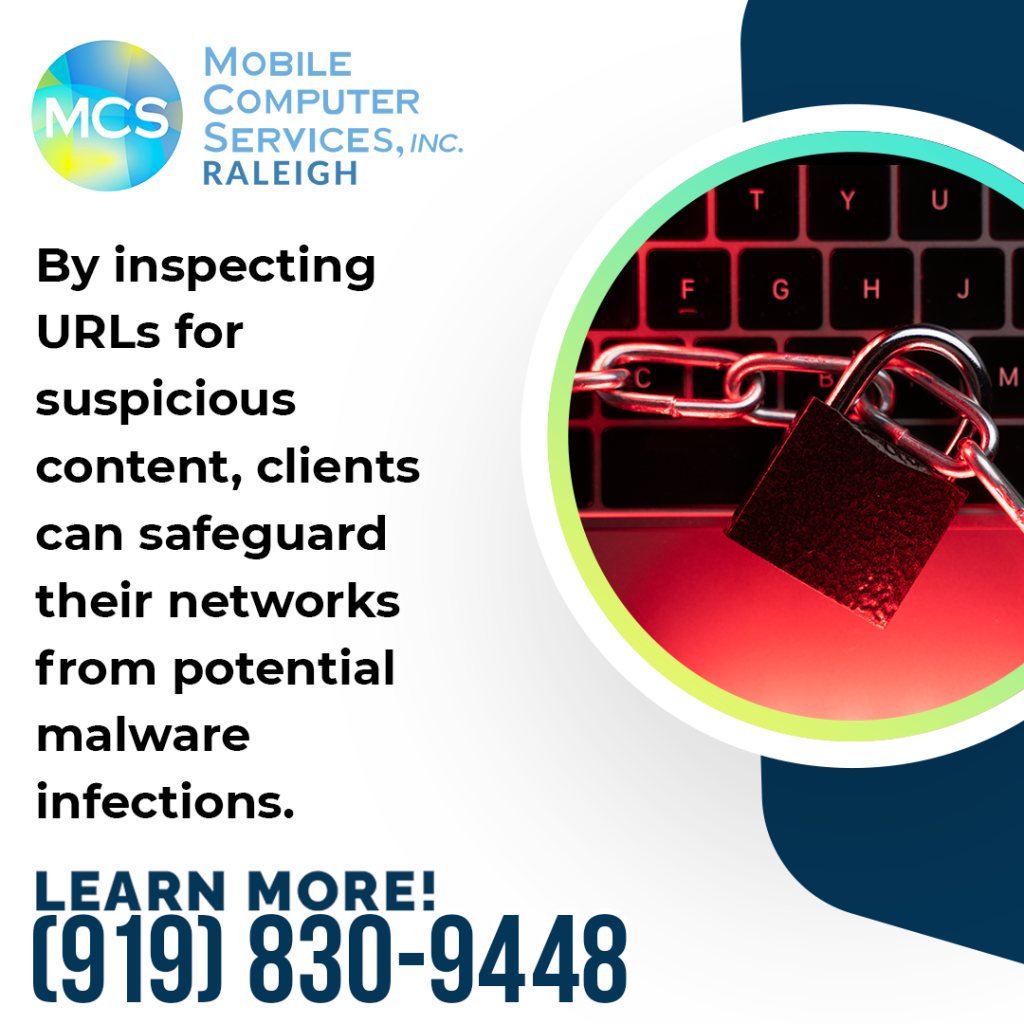Welcome to the new blog on email security by Mobile Computer Services, Inc., Raleigh, the trusted provider of IT services!
We’ve compiled essential tips from our IT services company on how to spot dangerous emails. In today’s digital world, staying vigilant against cyber threats is crucial. Learn to identify malicious emails and protect yourself and your organization from security risks. Let’s examine these practical strategies to enhance email security awareness and protect your digital assets.
Key Takeaways
- Trust your instincts for suspicious or urgent emails.
- Scrutinize the sender’s email address for anomalies.
- Avoid clicking on unfamiliar or suspicious links.
- Stay informed and cautious to protect data and privacy.
IT Services in Raleigh Answers “What are Malicious Emails?”
In cybersecurity, malicious emails are deceptive messages that trick recipients into taking harmful actions. These emails often appear legitimate, with sophisticated techniques used to convince the reader to click on links, download attachments, or disclose sensitive information. As providers of small business IT services in Raleigh, we frequently encounter clients who have fallen victim to these malicious emails. Such instances make it imperative to have effective small business IT support.

At our IT services company, we understand the grave risks posed by malicious emails. Hackers use these emails to gain unauthorized access to systems, steal valuable data, or deploy ransomware that can cripple small businesses. That’s why having robust IT support in Raleigh, such as Mobile Computer Services, Inc., is crucial for defending against these threats. By educating employees about the dangers of malicious emails and implementing stringent email security measures, small businesses can significantly reduce their vulnerability to such attacks.
One common type of malicious email is phishing, where attackers impersonate trusted entities like banks or government agencies to deceive recipients. Another threat is spear-phishing, a targeted form of phishing that is highly personalized to trick specific individuals within a company. These tactics underscore the importance of investing in small business IT services, prioritizing cybersecurity, and offering proactive solutions to safeguard against evolving threats.
Spam And Malicious Emails
In our line of work, we encounter spam and malicious emails daily, and it’s crucial to identify them quickly to avoid potential security risks. As providers of business IT services in Raleigh, we understand the importance of safeguarding sensitive information from cyber threats. Small businesses often lack the robust security measures that larger corporations have, making them more vulnerable to cyber attacks through email.
One common type of malicious email is phishing, where cybercriminals impersonate legitimate entities to trick recipients into divulging confidential information such as passwords or financial data. These emails often contain urgent requests or alarming messages to prompt immediate action, preying on the recipient’s emotions to bypass rational thinking.
Another prevalent threat is malware-laden emails, which can infect a system once the email is opened or a link/download is clicked. These malicious attachments or links can compromise the entire network, leading to data breaches or financial loss for the business.
Malicious emails and spam are unwanted messages sent via email but they differ in intent and content. Malicious emails are designed to cause harm, such as spreading viruses, stealing personal information, or perpetrating scams. They often use deceptive tactics, such as phishing, to trick recipients into revealing sensitive data or downloading harmful attachments. On the other hand, spam refers to unsolicited bulk messages sent to many recipients, typically for commercial purposes. While spam may be annoying and clog up inboxes, it generally does not carry the same harmful intent as malicious emails. Spam emails often promote dubious products or services and rely on volume rather than targeted deception to reach potential victims. While both are nuisances in email communication, malicious emails pose a more significant threat to users’ security and privacy.
To combat these risks, businesses must invest in robust email security solutions and regularly train employees to identify and handle suspicious emails. At our small-business IT support in Raleigh, Mobile Computer Services, Inc. prioritizes proactive measures to mitigate the impact of spam and malicious emails, helping businesses maintain a secure digital environment.
Detecting Malicious Emails
Detecting malicious emails requires a keen eye for suspicious patterns and behaviors. As a team of IT experts, Mobile Computer Services, Inc., Raleigh, understands the importance of staying vigilant when identifying potential threats in your inbox. Here are some tips to help you spot malicious emails:
Check the Sender’s Email Address
Examining the sender’s email address is crucial in identifying a malware email, especially for small business IT services. Various factors warrant consideration when assessing the sender’s email address:
- Spelling and Typos: Malicious emails often feature subtle misspellings or typographical errors in the domain name or username. For instance, “contact@yourcompnay.com” instead of “contact@yourcompany.com” or “admin@yahooo.com” instead of “admin@yahoo.com.”
- Emails with IP Addresses: Some malicious emails utilize IP addresses instead of domain names, such as “sender@[123.45.67.89],” which raises suspicion.
- Verify the Sender’s Organization: IT services advise verifying authenticity and cross-referencing the provided email address with the official contact information available on the organization’s website, especially for small businesses.
Detecting malware in an email requires meticulous attention to detail and skepticism toward unsolicited messages, particularly in IT services for small businesses. Scrutinizing the sender’s email address for anomalies is essential to mitigate potential risks.
Look for Spelling and Grammar Mistakes
Many malicious emails contain spelling and grammar errors. Legitimate companies typically proofread their emails before sending them out. Language errors can indicate a lack of professionalism and hint at a fraudulent attempt. When uncertain, contacting IT services is the optimal approach to safeguarding your small business in Raleigh.
Avoid Urgent Requests
Be cautious of emails that pressure you to act urgently, especially if they threaten dire consequences for not complying. Scammers often use this tactic to create a sense of urgency and prevent recipients from thoroughly evaluating the email’s authenticity. Legitimate providers of IT services in Raleigh understand the importance of clear communication without resorting to manipulative tactics.
Check for Generic Greetings
Legitimate companies often personalize their emails with your name or relevant details. Emails that begin with generic greetings like “Dear Customer” or “Dear Sir/Madam” should raise suspicion. Personalization adds credibility to the communication and is a standard practice among reputable service providers.
Be Wary of Requests for Personal Information
Legitimate companies, including those providing IT services in Raleigh, typically don’t ask for sensitive information like passwords or credit card details via email. Treat any such requests with skepticism and verify the sender’s identity through alternative means, such as contacting the company directly via phone or visiting their official website.
Check for Secure Connections
Legitimate businesses use secure connections (https://) for online transactions and communications. If the email contains links to insecure websites (http://), it could be a malicious email attack. Secure connections are essential for protecting sensitive information and ensuring the integrity of online interactions, especially in the context of IT services in Raleigh, where data security is paramount.
Watch for Attachments
Identifying a suspicious attachment within an email is pivotal in preventing malware infections and other security breaches, particularly for small business IT services. Here are strategies to recognize a dubious attachment:
- Exercise Caution with Zip or Archive Files: Cybercriminals often compress malicious files into zip or archive formats to bypass email filters. Exercise caution with unexpected archive files, considering scanning them with antivirus software before extraction.
- Be Wary of Password-Protected Attachments: Exercise caution when encountering password-protected attachments unexpectedly, as cybercriminals may use this tactic to conceal malware from email scanners.
- Scan Attachments with Antivirus Software: To mitigate potential threats, maintain up-to-date antivirus software on your device and scan any suspicious attachments before opening them.
Verifying Links
Verifying links within emails is a common method to identify malware, especially for small business IT services. Cybercriminals frequently disguise malicious links to appear legitimate. By hovering over the link without clicking it, users can view the URL it leads to, enabling them to discern suspicious or deceptive links.
Spot Fake Logos and Branding
Furthermore, vigilance against fake logos and branding is vital for small IT services. Cybercriminals often mimic the logos and branding of reputable companies or organizations to lend credibility to their malicious emails. Scrutinizing all email elements and comparing them with official sources can reveal inconsistencies indicative of spoofed branding.
Verifying Email Signatures
Verifying the email signature can help authenticate the sender’s legitimacy, especially for small business IT services. Legitimate emails from professional entities typically feature clear, professional-looking signatures. Any disparities or irregularities in the signature, job title, or contact information should raise suspicion and prompt further verification through official channels.
Employing Email Security Tools
Recognizing malware emails can be challenging due to evolving tactics, making it imperative for small business IT services. Employing email security tools can bolster defenses against malware threats, particularly for organizations offering IT services to small businesses. These tools leverage advanced algorithms to analyze various email elements, including attachments, links, headers, and sender information, enhancing real-time protection against potential threats.
Trust Your Instincts
Lastly, If an email seems too good to be true or creates a sense of urgency, it’s best to err on caution. Malicious actors often use these tactics to manipulate recipients into taking action without thinking.
As a leading provider of small business IT services in Raleigh, Mobile Computer Services, Inc. emphasizes maintaining awareness and exercising caution, paramount to safeguarding yourself and your organization against malicious email attacks. By adhering to these recommendations and staying vigilant, you can fortify the security of your data and privacy, ensuring protection from potential threats.

The Need to Educate Employees
To effectively combat email threats, we must prioritize educating employees on detecting and handling suspicious emails. Employee education is crucial in enhancing an organization’s overall cybersecurity posture. By training employees to recognize red flags in emails, such as unusual sender addresses, unexpected attachments, or requests for sensitive information, companies can significantly reduce the risk of falling victim to email-based cyber attacks.
Regular training sessions should be conducted to inform employees about the latest email threats and tactics used by cybercriminals. These sessions can cover phishing, malware, social engineering, and best practices for securely handling emails. Additionally, simulated phishing exercises can help employees practice identifying and reporting suspicious emails in a controlled environment.
Mobile Computer Services, Inc., a provider of IT services in Raleigh, strongly advocates for small businesses to prioritize employee cybersecurity training. Employees must receive comprehensive education on cybersecurity measures. By equipping staff with the necessary knowledge and skills, businesses can effectively mitigate risks and bolster the organization’s overall security posture, safeguarding against potential cyber threats and breaches.
Contact IT Services
Contact the IT services team of Mobile Computer Services, Inc., Raleigh, for immediate assistance if you encounter a suspicious email that raises concerns about cybersecurity threats. Our team is here to help you navigate through any potential risks and ensure the safety of our company’s digital assets. When reaching out to us, keep the following in mind:
- We understand the urgency: Your security is our top priority, and we are ready to act swiftly to address any issues arising from suspicious emails. You can count on us to respond promptly and effectively.
- You are not alone: Dealing with cybersecurity threats can be stressful and overwhelming. Remember that you have a dedicated team of experts ready to support you every step of the way. We are in this together.
- Stay vigilant, stay safe: By reporting suspicious emails to us, you protect yourself and the entire organization. Your actions contribute to creating a more secure digital environment for everyone.
Don’t hesitate to contact the IT services team at Mobile Computer Services, Inc., Raleigh, whenever you have doubts or concerns about the emails you receive. We can proactively defend against cyber threats and keep our systems secure.
Frequently Asked Questions
How Do Hackers Typically Gain Access to Personal or Sensitive Information Through Malicious Emails?
At Mobile Computer Services, Inc., Raleigh, we understand the importance of safeguarding your business against cyber threats. Hackers frequently exploit vulnerabilities through malicious emails, luring recipients to click on harmful links or download malicious attachments. Through social engineering tactics, they manipulate individuals into divulging confidential data or login credentials, compromising sensitive information. It’s crucial to remain vigilant and adopt robust email security practices to mitigate these risks. We encourage you to contact our IT services for comprehensive protection and guidance tailored to your business needs.
Are There Any Specific Red Flags or Warning Signs to Look Out for in Potentially Dangerous Emails?
At Mobile Computer Services, Inc. in Raleigh, we emphasize the importance of staying alert when handling emails to safeguard against potential threats. Red flags such as unsolicited requests for personal information, generic greetings, spelling errors, urgent demands, or suspicious attachments should trigger caution. These indicators may signal phishing attempts or malware infiltration. We can effectively shield ourselves from malicious emails by vigilance and promptly recognizing these warning signs. Don’t hesitate to contact our IT services for tailored guidance and proactive protection.
Can Opening a Suspicious Email Without Clicking on Any Links or Attachments Still Pose a Threat to a Computer or Network?
Indeed, at Mobile Computer Services, Inc. in Raleigh, we recognize that even opening a suspicious email without interacting with its links or attachments can jeopardize computer systems or networks. Certain emails harbor malicious code capable of activation upon opening, potentially resulting in infections, data breaches, or unauthorized access to our systems.
Hence, it is paramount to exercise caution and refrain from opening emails from unfamiliar sources or those exhibiting any semblance of suspicion. If you encounter such emails, promptly seek assistance from our IT services in Raleigh to mitigate potential risks and ensure the security of your systems. Contact us to learn more about IT services in Raleigh.
How Often Do Cyber Attackers Change Their Tactics and Techniques When It Comes to Crafting Malicious Emails?
At Mobile Computer Services, Inc. in Raleigh, we acknowledge that cyber attackers continually adapt their tactics and techniques to create malicious emails. Through evolving strategies, they seek to circumvent security measures and dupe unsuspecting users. It is imperative to remain vigilant and stay informed about the latest trends in cyber threats to safeguard our systems effectively. Regular training and awareness programs are vital in equipping us to identify these evolving tactics and mitigate the risks of these dangerous emails. We can better protect our organizations from cyber attacks by staying proactive and informed.
What Steps Can Individuals Take to Further Protect Themselves From Falling Victim to Dangerous Email Scams or Phishing Attempts?
At Mobile Computer Services, Inc. in Raleigh, safeguarding against dangerous email scams or phishing attempts is paramount. We encourage a proactive approach by meticulously scrutinizing suspicious emails, verifying senders’ identities, and refraining from clicking on links or downloading attachments from unknown sources.
Additionally, regularly updating security software and educating ourselves on common phishing tactics are crucial in maintaining online safety. By embracing these practices, businesses can fortify their defenses and minimize the risk of falling victim to cybercriminals’ schemes, ensuring the protection of sensitive information. Don’t hesitate to contact us for tailored guidance and comprehensive IT services.
Conclusion
Identifying and addressing dangerous emails is vital in safeguarding your business against cyber threats. Adhering to these guidelines and educating employees on signs of malicious emails can significantly mitigate the risk of falling prey to cyber-attacks. It’s essential to remain vigilant and promptly seek assistance from your trusted IT services provider in Raleigh if you encounter any suspicious emails. Stay proactive, stay safe, and prioritize your business’s security! For further information about IT support in Raleigh or to schedule a consultation, please get in touch with Mobile Computer Services, Inc. at (919) 830-9448.

